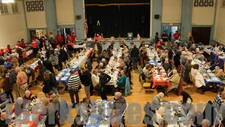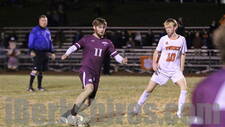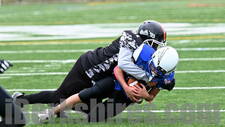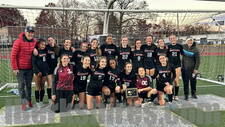America’s Choice: Lady or Tiger?By Susan Bush
12:00AM / Sunday, September 04, 2005
 | | Artist Don Gummer's provocative "Primary Separation" sculpture on Marshall Street in North Adams. |
The rock on Marshall Street makes sense to me now.
Artist Don Gummer’s MASS MoCA-commissioned “Primary Separation†43,000-pound sculpture was, according to the artist, designed more as artistic question than statement.
Gummer’s spilt-down-the-middle boulder is stationary; the two sides do not move from their contained space.
During an Aug. 11 iberkshires.com interview, Gummer spoke about interpretation.
“That is a question for observers to answer for themselves,†he said. “Is it being pulled apart or coming together? That will be up to individual interpretation.â€
As the aftermath of Hurricane Katrina unfolds, as new difficulties spring forth as quickly as others are somewhat relieved, that question takes on a new and powerful focus: Will this nation pull apart or come together in the days ahead?
Don’t answer too quickly. The question requires much, much more than a knee-jerk reaction of smooth, soothing words. The consequences of this unrivaled natural disaster are likely to affect every citizen of this country for a long, long time and the battles are already brewing.
The rescue and evacuation efforts have at last taken hold and people are being rescued by the thousands. The New Orleans-based Superdome – described by some as the “shelter from hellâ€- is finally empty and the Houston, Texas Astrodome has reportedly become a better, but certainly not ideal, care zone for hurricane survivors. The state of Massachusetts is preparing for the arrival of about 2,000 evacuees and other states are opening their doors to a new population.
And while there is great, great good occurring now and more positives are waiting to happen, there are serious, serious issues to be examined, issues surrounding an acknowledged breakdown of communications between the local, state, and federal agencies all desperately trying to save lives, issues surrounding the apparent lack of emergency rations and supplies at the Superdome, issues surrounding an alleged media focus on New Orleans and a feeling among some in Mississippi and Alabama that their devastation and loss of life was somehow construed as less urgent.
A weekend Associated Press news article quoted a clearly distraught Mississippian:
“I say burn all the bridges and let ‘em rot there,†said [a story source, a man who was referring to the situation in New Orleans]. “We’re suffering over here, too, but we’re not killing each other. We’ve got to help each other. We need gas and food and water and medical supplies.â€
And the Mississippi-based Sun-Herald newspaper, which serves the Biloxi-Gulfport region, published a weekend editorial that articulated frustration.
“We understand that New Orleans was also devastated by Hurricane Katrina but surely this nation has the resources to rescue both that metropolitan and ours,†the editorial said.
Our nation’s seemingly favorite sport, Monday-morning quarterbacking, is well into its’ first half, coached by that ever-popular trio of finger-pointers “Coulda,†“Woulda,†and “Shoulda.â€
But this ain’t no game. There can be no winners. And a very big question looms: What’s next?
U.S. Health and Human Services Secretary Michael Leavitt said on Sept. 4 that the death toll from the hurricane and the subsequent floodings is in the thousands. Body recovery will take a long time.
Families are separated, people are displaced, reports of illness such as dysentery have become public, and many, many dazed and weary folks have nothing to go home to.
Nothing.
Hurricane survivors are being shuttled across the country from one shelter to another and what is undeniably true is that shelters cannot replace or become “home.†Some folks are likely to return to their hometown regions for what will be massive rebuilding efforts; others will not, and will endeavor to make new lives in new places, hopefully surrounded by new friends.
They will need jobs and living spaces. Some may need job training. Some may require public assistance for a time. Children will need to be educated. “Culture shock†is likely to become much more than a catch phrase.
Will we come together or pull apart?
The gasoline price hikes that came immediately after the hurricane struck caused some real concern, and some real anger. Network news economists are predicting price hikes that could impact a slew of goods and services, as well as shortages of other items.
Paychecks, by and large, are not getting any fatter, and winter is coming. This hurricane exposed levels of extreme poverty that, prior to the storm, this nation barely acknowledged.
Know two things: poverty excuses no race, color or creed and is not an exclusive product of the South.
The story of Hurricane Katrina is nowhere near finished. The forces of nature penned the first chapters; the forces of humanity will write the epilogue.
Will we come together or be pulled apart?
In the late 1800s, writer Frank R. Stockton wrote a short story titled “The Lady or the Tiger.†The story winds around a “semibarbaric king†who administers his kingdom’s justice by tossing an offender into an arena, and allowing the offender to open one of two doors. Behind one door, a beautiful woman waits, behind the other, a vicious tiger paces. The offender is either saved or shredded, depending upon choice of door.
When the king finds that his daughter has taken a lover believed to be beneath her social status, the suitor is brought to face the two doors.
According to the story, the young man looks to his beloved princess, who sits beside her father above the fray, and seeks a sign of which door to choose. The princess is emotionally torn; behind one door is a very fair and comely woman whom she has always considered a rival, behind the other is an extremely nasty-tempered tiger. Whichever door is opened by her suitor, he is lost to the princess. Jealousy and despair battle within her soul, and with a flick of her wrist, she indicates that her beau should open the door to the right. Believing in his true love, the suitor opens the door.
And that is where the story ends. The reader must decide which emotion ruled the princess.
As collective citizens of this country, we are standing before two closed doors. As individuals, we will choose to open one door or the other. Which nation will ultimately emerge, the lady or the tiger?
Will we come together or will we pull apart?
The United States remains a government of, for, and by the people. The human sculpture we have yet to create, the story we have yet to write, is very much in our hands.
Like Stockton, I leave the ending to you.
Susan Bush may be reached via e-mail at suebush123@adelphia.net or at 802-823-9367.
|



















